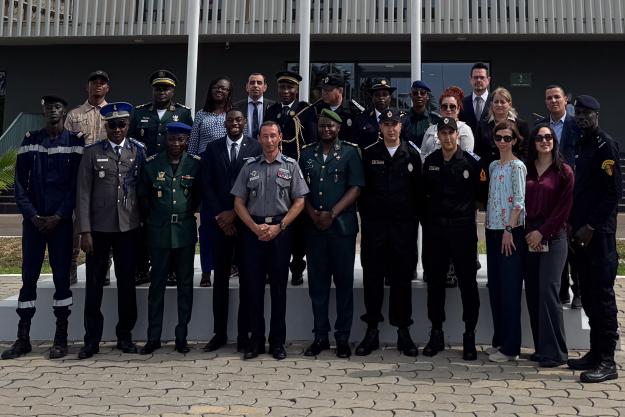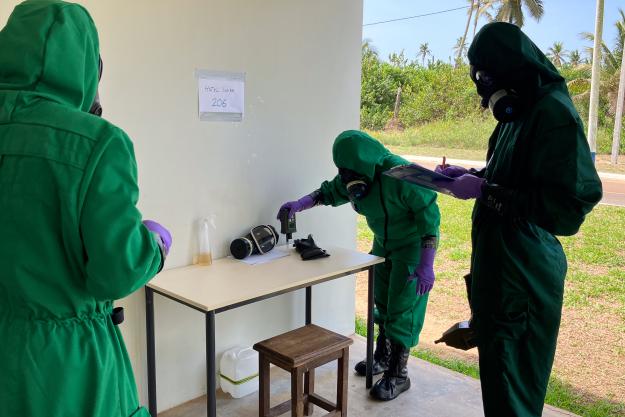
Participants in a group photo at the training on the investigation of chemical incidents, co-organised with the Académie Internationale de Lutte Contre le Terrorisme (AILCT) and supported by the National Authority of Côte d’Ivoire and the OPCW, held from 4 to 11 April 2025.
THE HAGUE, Netherlands—26 May 2025— The Organisation for the Prohibition of Chemical Weapons (OPCW), in collaboration with the Académie Internationale de Lutte Contre le Terrorisme (AILCT) and with the support of the National Authority of Côte d’Ivoire, conducted the “Advanced course on the Investigation of Chemical Incidents for French-Speaking Member States in Africa” from 4 to 11 April in Jacqueville, Côte d’Ivoire.
The hands-on training was specifically designed to equip first responders with the knowledge and practical skills needed to effectively investigate chemical incidents. Focusing on scene documentation and sampling techniques, the course exposed participants to real-life scenarios building their capacity to respond to incidents involving toxic industrial chemicals (TICs) or chemical warfare agents (CWAs) potentially used as weapons.
Ms Sika Dossim, a Pharmacist Biologist and Senior Lecturer at the University of Kara in Togo, reflected on the practical training she received: “Conducting an investigation in the event of chemical crime means playing a smooth game with all the components of the investigation: equipment, environment, colleagues and collaborators.” Her comment echoes the course’s emphasis on coordination, preparedness, and methodical response in a real-world scenario.
A first training of its kind in the region focusing on chemical incident investigation, the course forms part of a broader training cycle under the objective of enhancing protection and response capabilities against chemical incidents or attacks—of the sixth phase of the OPCW Africa Programme. Funded by France, the course addresses the capacity-building needs expressed by French-speaking African Member States.

Training participants engage in a real-life scenario exercise simulating a suspected chemical attack involving toxic industrial chemicals (TICs) or chemical warfare agents (CWAs). Participants practice sketching the scene, performing detection tasks, and collecting samples.
The event brought together 15 participants from seven countries: Algeria, Burundi, Cameroon, Côte d’Ivoire, Morocco, Senegal, and Togo—marking a significant step in strengthening regional preparedness and cooperation in chemical emergency response.
Background
The Africa Programme, launched in 2007, is a capacity-building initiative designed to support African Member States in implementing the Chemical Weapons Convention (CWC). Addressing the continent’s needs in chemical safety and security, emergency response, and development, the Programme assists countries in enhancing their legislative frameworks, build technical expertise, and promote regional collaboration to prevent the misuse of toxic chemicals.
As the implementing body for the Chemical Weapons Convention, the OPCW, with its 193 Member States, oversees the global endeavour to permanently eliminate chemical weapons. Since the Convention’s entry into force in 1997, it is the most successful disarmament treaty eliminating an entire class of weapons of mass destruction.
In 2023, the OPCW verified that all chemical weapons stockpiles declared by the 193 States Parties to the Chemical Weapons Convention since 1997 — totalling 72,304 metric tonnes of chemical agents — have been irreversibly destroyed under the OPCW’s strict verification regime.
For its extensive efforts in eliminating chemical weapons, the OPCW received the 2013 Nobel Peace Prize.
